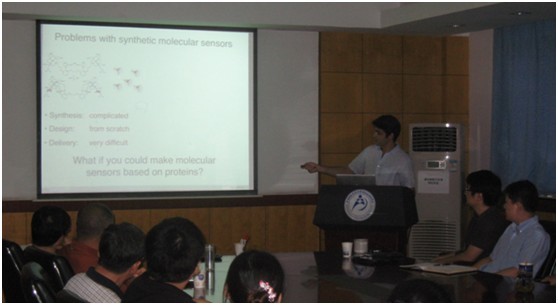

Dr. Mikhail Shapiro visited our group at Wuhan Institute of Physics and Mathematics
In this seminar, Dr. Shapiro first briefly introduced the basic principle of applications of molecular reports in non-invasive magnetic resonance imaging (MRI), and afterwards the concept of genetically encoded molecular reports and its advantages.
Dr. Shapiro created functional reporters for MRI-- two metalloproteins to change the T1 and T2 MRI contrast in response to specific molecular signals. In one case, he used directed evolution to modify an iron-containing bacterial enzyme into an MRI sensor of dopamine. This reporter was used to image dopamine release in rat striatum. In another example, he genetically engineered the human iron storage protein ferritin into self-assembling multi-functional nanoparticles that aggregate and produce MRI contrast in response to phosphorylation by the neural signaling kinase PKA2. These technologies provided the first proofs of concept for functional MRI imaging using genetically engineered reporters.
Finally, Dr. Shapiro presented his recent work about improving the sensitivity of non-invasive molecular imaging by using hyperpolarized xenon MRI. With hyperpolarized technique, Gas vesicles (GVs) can be detected at picomolar concentration, the sensitivity is about 10,000 times higher than any known genetic reporters for conventional MRI.
Dr. Shapiro's seminar has attracted many faculties and students, and resulted in a discussion more than 40 minutes. Dr. Mikhail Shapiro is a Miller Research Fellow at the University of California at Berkeley, where he is engineering new technologies for non-invasive molecular imaging of the brain. Dr. Shapiro and his colleagues have pioneered the development of genetically encoded molecular reporters for MRI of neurotransmitter release, kinase signaling and gene expression. Dr. Shapiro's work has been published in journals such as Nature Biotechnology and Nature Communications. In 2010, the Technology Review recognized Dr. Shapiro as one of the world's top 35 innovators under age 35.

--The Academic Report--

Innovation Academy for Precision Measurement Science and Technology, CAS.
West No.30 Xiao Hong Shan, Wuhan 430071 China
Tel:+86-27-8719-8631 Fax:+86-27-8719-9291
Email:hanyeqing@wipm.ac.cn
鄂ICP备15017570号-1